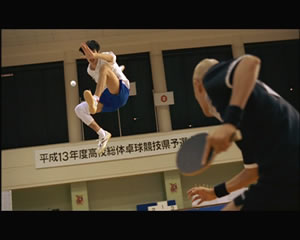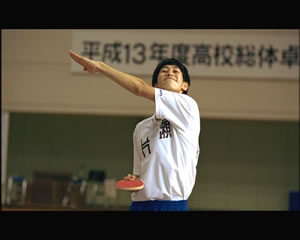Ping Pong
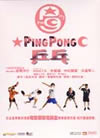
- Made: 2002
- Format: DVD
- Region: Region 3 NTSC
- Release Date: 2003
- Company: Panorama
- Length: 114 minutes
- Picture: Letterboxed 1.85:1 Widescreen
- Sound: Dolby Digital 5.1, DTS
- Language: Japanese with removable Subtitles
- Extras: Chapter Select
- Classification: IIA
Director:
Fumihiko Sori
Cast:
Yosuke Kubozuka, Arata, Sam Lee, Shido Nakamura, Koji Ogura, YosiYosi Arakawa, Takahiro Hirano, Mako Ishino, Koen Kondo, Erika Mabuchi, Suzuki Matsuo, Asumi Miwa, Ayumu Moriyama, Mari Natsuki, Akira Nishihara, Satoshi Oe, Mikio Sato, Kenichi Suemitsu
Ping Pong was caught up in Shaolin Soccer fever in a bad way. Soon after Stephen Chow's madcap antics on the football pitch Ping Pong was released in Japan in August 2002. Hyped as Japan's answer to the CGI enhanced sports-comedy genre, Ping Pong was unfairly typecast as such and it will be a long time before Ping Pong fully breaks free from these misguided associations. After struggling to make any significant impact at the Japanese and HK box office, it went on to receive rave reviews at international film festivals with healthy DVD import sales from the West. It was awarded several nominations at the Japanese Film Awards 2003 and also won categories at the Blue Ribbon Awards and Mainichi Film Concours. (I think the fashionable film critic term is calling it a 'sleeper hit').
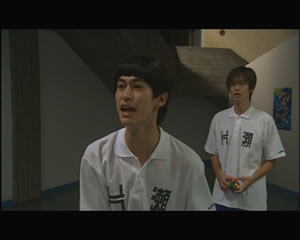

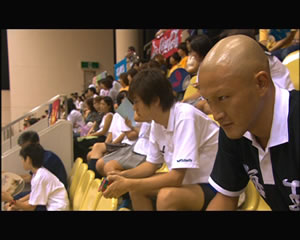
As with the excellent Aoi Haru (Blue Spring), this is another Manga adaptation from Taiyo Matsumoto. It is a story that links boyhood friendship to the intense world of sporting competition. Boyhood friends Peco (Yôsuke Kubozuka) and Tsukimoto (Arata) are ping pong competitors who are struggling to win the big tournaments under the coaching of Butterfly Joe. Peco remains volatile and Tsukimoto is nicknamed 'Smile', because he never does. As Peco's hunger for the game slips away, Smile sees his childhood hero fall from grace. With the support of Granny, who has her own ping pong dojo, Peco once again realises his true calling in life. As the final tournament approaches Peco rediscovers his love of ping pong, but can he and Smile overcome an array of foes including Dragon and China?
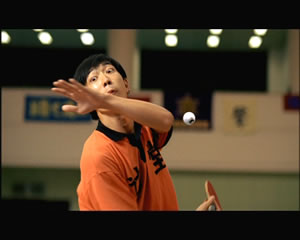


The whole tournament based feeling to Ping Pong immediately brings comparisons to films such as Karate Kid and Shaolin Soccer. Rookie director Fumihiko Sori ensures that the competition supports the characters rather than dominating them. There are series of surreal sequences and flashbacks to Peco and Smile's childhood which help allude to a special bond between these lifelong friends. A more clichéd zero to hero film would have moulded Peco and Smile into one character, but this fresh approach rightly demotes the competition behind the interaction between two friends as they go on to fulfil their childhood ambitions. Both Peco and Smile deliver spell-binding performances, managing to bring their characters to life. As with most of the film, you are told very little. The story-telling is very subtle and as a result much more powerful.
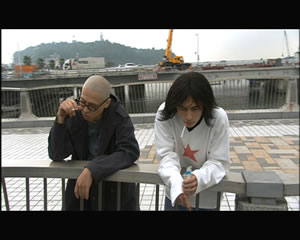

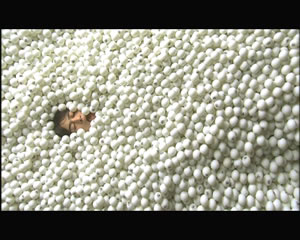
There is some use of CGI (Sori previously worked on the CGI for Titanic) but not in the overblown sense. Ping Pong is not about elevating the sport into a superhuman arena. In many ways Sori draws on the central themes from martial arts movies. Along with martial arts masters, this is about absolute mastery of a technique. Dragon and his skinhead-filled Dojo, are a parody of the Shaolin Monastery with its gruelling training and unforgiving rules. With their ruthless pursuit of excellence, the one thing they forget about is their love for the game. China, (played by Sam Lee - Gen-X-Cops) plays the foreign star that is capable of reading a player's style purely by the racket sound. As with the elaborate kung-fu of Lau Kar Leung and co, much of the character development is done through action rather than dialogue. I could write a few hundred words on how brilliantly the ping pong is captured on screen, but that is worth discovering for yourself.
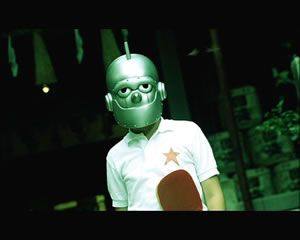

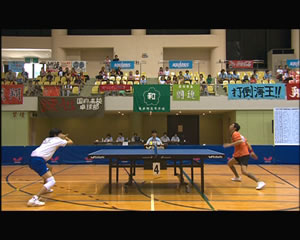
DISC:
Whatever you do, make sure you avoid the Region 2 ICA disc. The Region 3 disc from Panorama Entertainment is a stronger package and a lot cheaper! The Region 3 disc comes with a widescreen letterboxed print 1.85:1 and DD5.1 / DTS5.1 audio in Japanese. There is chapter access and removable English and Chinese subtitles. The ICA disc has a cropped anamorphic widescreen print (1.75:1) and only has the DD2.0 audio track. The subtitles are non-removable and there are no extras, not even chapters! If you can play Region 3 NTSC discs then get the import. There is also a special edition version in Japan, but many of the features will be of little use without knowing Japanese.
OVERALL:
This is an absolute classic from Fumihiko Sori. Japanese cinema is already being trawled for horror and anime by the West, but this one has so far slipped under the radar. A series of brilliant performances which have been brilliantly captured on screen have made Ping Pong nothing short of a cinematic triumph. If genius is the ability to make things look easy, then they have taken an unfashionable story within an unfashionable sport and by the end they will have you reaching for your racket!
Paul
